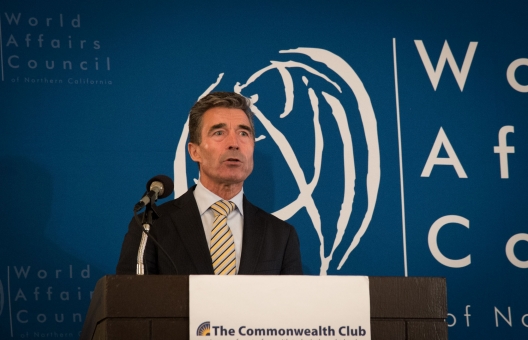 NATO was founded to unite America and Europe in the world’s most powerful alliance.
NATO was founded to unite America and Europe in the world’s most powerful alliance.
From the ruins of the bloodiest conflict in history, a new rules-based international order emerged. Delivering unprecedented peace, progress and prosperity over decades.
NATO has provided a cornerstone of that shared security. NATO prevented the Cold War from getting hot. When the Berlin Wall fell, NATO helped bring Europe together. We offered a hand of friendship to former adversaries and opened the door to new Allies.
Today, we are an Alliance of 28 nations and 900 million people. Including everyone here on the West coast. And we are an Alliance that has partnerships with over 40 countries and organisations on five continents.
So whether you are in San Francisco or Sacramento. Or in Brussels or Bucharest. NATO’s pledge to the collective defence of its members protects you. It means that we will stand up for one another and fight together when we have to. As we have done for more than a decade in Afghanistan.
But today, the international order that has guided us, that has upheld principles and shared values, that has pressed back against the tide of conflict, this order is under threat.
Today, an arc of crisis extends from Central Africa and the Sahel, to Syria, Iraq and the wider Middle East.
In Europe, Russia has ripped up the rulebook with its aggression against Ukraine. And across the Pacific, tensions are rising on the Korean Peninsula and territorial disputes remain unresolved.
Our world is more connected. And more competitive. But also more chaotic. And more precarious.
So it is vital that we maintain the rules-based order that promotes freedom, democracy and the rule of law. . . .
Global threats like terrorism, piracy and missile attacks cross borders. They are too big for any one country to tackle alone. We can only deal with them together.
Not just as an Atlantic Alliance. But as a global network. Our security does not stop at the East Coast. The United States and Canada both border on the Pacific. Other Allies have territories and interests in the Pacific. And all Allies have concerns about the Pacific.
Our partners provide troops, planes and ships for our operations. They provide financial support. And together, we help build stability in the world.
In the Pacific, NATO has four partners – Japan, South Korea, Australia and New Zealand. Australia and New Zealand have deployed many troops under the NATO banner in Afghanistan. Japan and South Korea have made big contributions to reconstruction and development efforts there.
All four Pacific partners have taken part in our mission to fight piracy off the coast of Somalia. And all four have signed formal partnership agreements with NATO. We are deepening our political dialogue. And extending our practical cooperation to new areas like disaster relief and cyber defence.
In the last few years, I have visited Australia, Japan and South Korea. I was struck by how much their citizens know about NATO. And by their enthusiasm to do more with NATO. And we want to do more with them. Because while we may be far apart on the map, we share the same values and the same commitment to a more stable world. . . .
Both Europeans and Americans have a stake in making sure that the Pacific Ocean can live up to its name. And remain the peaceful ocean.
The success of the Pacific region depends on trade.
Trade can foster growth and cooperation. But on its own, it cannot deter autocratic regimes. It cannot defend against attack. And it cannot guarantee peace.
For this task, we need a strong, transparent, rules-based international order. An order that we started to create in this very city all those years ago. One that is upheld by the unshakable bond between this great country and its closest friends in Europe. An order that NATO will continue to uphold in the decades to come.
Excerpts from “America, Europe and the Pacific,” speech by NATO Secretary General Anders Fogh Rasmussen, San Francisco, July 9, 2014.
Image: Secretary General Anders Fogh Rasmussen, San Francisco, July 9, 2014 (photo: NATO)
